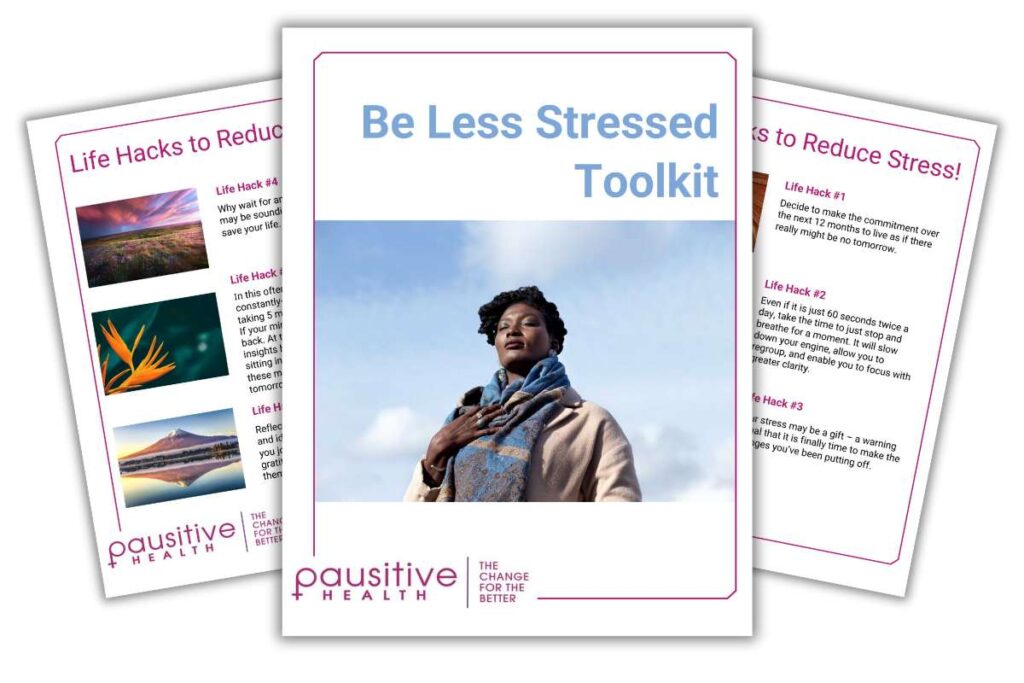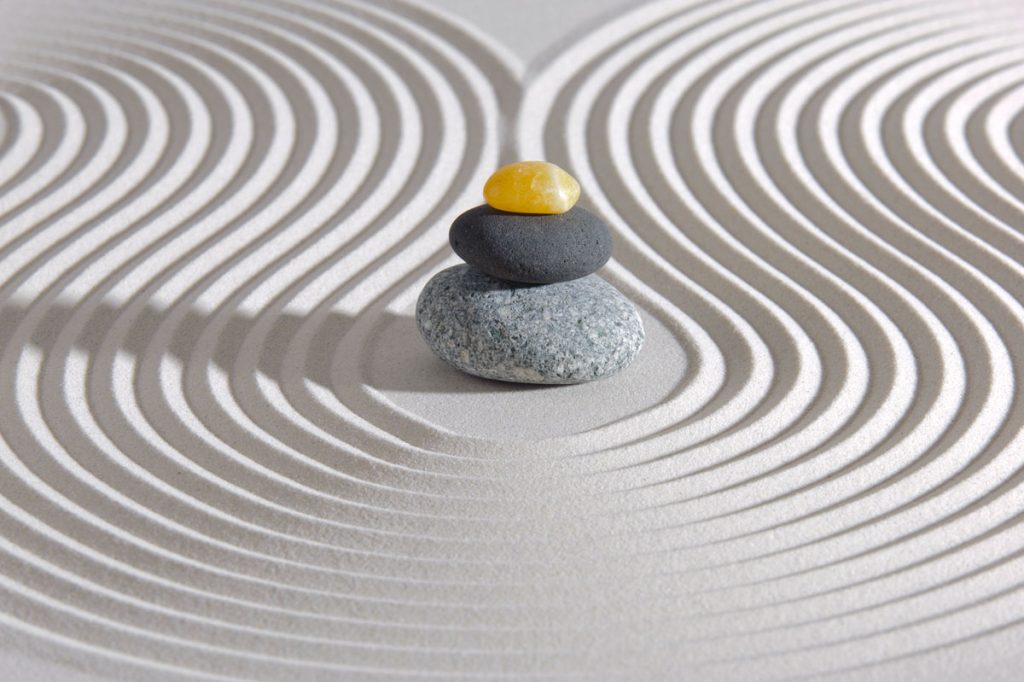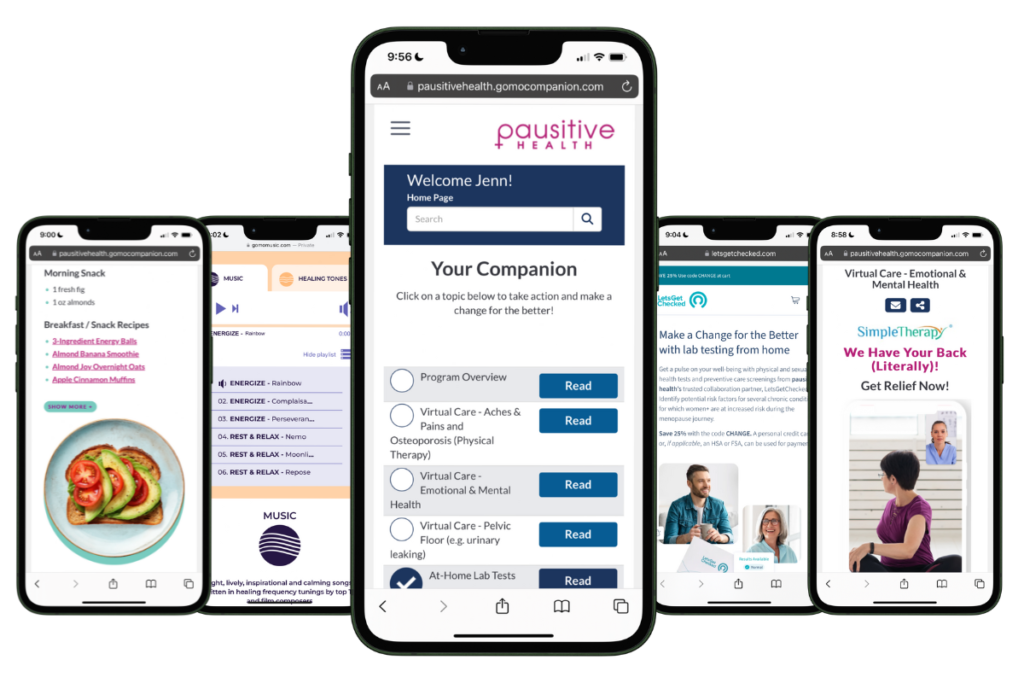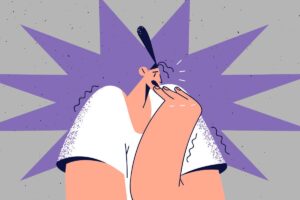Have you ever blamed your behavior or mood on PMS (premenstrual syndrome) or hormones? It’s a common utterance for women used to riding the emotional rollercoaster during their menstrual cycle. But that rollercoaster can take even more significant emotional dips during menopause. The feelings may range from sadness to rage. Just as women+ experience hormonal fluctuations during their reproductive lives, it may be harder to co-exist through menopausal hormone fluctuations. Try these coping strategies to stop what feels like an out-of-control ride that becomes the norm for some women experiencing mood swings during the menopause transition.
Menopause emotions
Is the natural ebb and flow of hormones during the menopause transition causing you to feel you’re going crazy? Do little things set you off? Or are you struggling with low energy or depressive moods?
The whirlwind of emotions felt by women during menopause can be overwhelming.
Even if your menstrual cycle was never a rollercoaster of emotions, it might become one as you go through the menopause transition.
You may be happy one minute and sad or even full of rage the next.
The shift in your mood can catch you off guard because it may happen for seemingly no reason. Little things may bother you. Your response may be way out of proportion to the issue.
Mood swings may be one of the first signs of the impending menopause transition.
You may feel:
- Low mood
- Anger
- Rage
- Depression
- Sadness
- Loneliness
- Irritability
- Anxiety
- Low self-worth
- Forgetful
- Unable to concentrate
- Low energy
- Short-term memory loss
The constant up-and-down motion can turn your life upside down, including your career, sense of self, and relationships.

Mood swings
In a pausitive health survey, mood swings were the top emotional and mental health concern.
Low mood, anger or rage, and depression were also top responses.
One woman lamented, “It is difficult to think of anything positive about this time of life.”
Hormone fluctuations contribute to some of the mood swings, and societal and personal perceptions of menopause can also impact how you feel.
Depending on your perspective, just realizing you’re on the menopause journey can impact you emotionally. For some women+, it’s a signifies getting older and saying goodbye to their reproductive years, which may bring sadness. The feeling may be even more intense for those who enter menopause before the average age of 51 due to cancer treatment or an underlying medical condition, particularly if they wanted to carry a pregnancy and now cannot biologically.
The physical symptoms can also lead to emotional overwhelm. Weight gain is a common menopausal problem. If you gain 10-20 extra pounds, there’s a psychological impact related to those body changes.
Monitor your mood swings. What life and gynecological factors set them off?
Stress is a common trigger, and during the hormonal transition, your stress tolerance may be less. You may find minor things set you off into a fit of rage, and managing that stress-filled anger may be more difficult.
Ready to Be Less Stressed?
The menopause journey may trigger a craving for less than healthy eating options, negatively impact your sleep, lead to fatigue, and aches and pains. Next thing you know you have landed in a sedentary state of mind.
Is lack of sleep a symptom? It’s a challenge to sleep during the menopause transition, and the lack of it has a profound impact on you physically and emotionally.
How well are you doing relative to healthy eating and regular physical activity? Both can contribute to emotional health and well-being.
Many outside factors can impact the frequency and severity of your mood swings. Managing these external forces can help you survive these fluctuations.

Be Less Stressed
Feeling stressed or overwhelmed? Learn life hacks to reduce stress with the Be Less Stressed toolkit.
"*" indicates required fields
Mood swings and depression
It’s also vital to manage mood swings because you don’t want them to spiral out of control. Mood swings can also be a sign of a mental illness such as bipolar disorder or depression.
Historically, it has been reported that more than 40% of menopausal women have depression, especially during perimenopause. However, recent research indicates that although depressive symptoms may be common, it is not clear if actual major depressive disorder/clinical depression is as common as previously thought. Although those with a prior history of depression were found to be at greater risk of an episode related to the hormonal transition, the study also calls into question whether or not the chance of developing new-onset depression, or even depressive symptoms, is increased.
Some factors reported to be associated with a greater risk of depressive symptoms during the menopause journey included:
- surgical menopause
- stress life events
- adverse experiences during childhood
- being in a racial/ethnic minority
- higher BMI
- issues with finances
- unemployment
In a pausitive health survey, one woman described the mood swings as a “ticking time bomb.” They were so bad she commented she couldn’t stand to be around herself.
That’s what can be disconcerting or even alarming about mood swings. They can quickly manifest into more than just bothersome menopause symptoms.
Monitor how you feel as your mood swings up and down.
Call your doctor if you begin feeling unworthy, hopeless, or experience a lack of interest in your favorite activities or social events. You are not alone, and support is available.
If your symptoms affect your ability to function and/or last more than two weeks, they could be a sign of depression. Here are additional questions to ask yourself.
Call 9-8-8
Anxiety and the menopause journey
Some women+ also experience feelings of anxiety, another condition with a historical association with the menopause journey. Anxiety may hit you for the first time during the hormonal transition, or it may be exacerbated. It can also make menopausal symptoms worse.
Some research suggests the possibility that anxiety can be a cause and result of vasomotor symptoms (VSMs: hot flashes, night sweats, palpitations) and its presence might also be a predictor for moderate to severe VSMs.
If you’re experiencing anxiety, it can make mood swings worse. Try these anxiety treatment options.

Coping with mood swings
When you’re riding the emotional rollercoaster of the menopausal transition, how do you cope?
Do you go into a fit of rage or retreat to isolation? Do you resort to unhealthy behaviors like eating comfort food high in fat, sugar, and salt or drinking alcohol?
If you resort to unhealthy behaviors, you may do more harm than good.
For example, a bowl of ice cream may feel good during the heat of the moment, but it will not make you feel better in the long run. And too many bowls add to your risk of weight gain and chronic conditions like high cholesterol, diabetes, metabolic syndrome, and cardiovascular disease.
It often comes down to the four basics you’ve heard your whole life – eat healthy food, exercise, get enough sleep, and manage stress.
Focusing on those foundational healthy lifestyle habits can slow the emotional rollercoaster.
Exercise
When you’re feeling down or full of rage, can you take five minutes and walk outside?
Exercise is a natural way to clear your mind and manage a mood swing.
Think about how you feel after you’re physically active. Albeit a little tired and perhaps sore, you probably feel better overall.
Exercise also increases your energy levels over time, and it’s a way to leave your frustrations of that last moment behind.
A study published in JAMA Psychiatry found exercise decreased the odds of becoming depressed by 26%.
Researchers found that 15 minutes of heart-pumping activity or an hour of moderate exercise can lower your depression risk. And for some people, physical activity works as well as anti-depressants.
No matter what you do, the study found any exercise is better than none. Try these menopause exercise videos.
Sleep
How do you feel the next day if you wake up too early or have a restless night of sleep?
Your sleep may be disrupted by night sweats, menopause palpitations, anxiety, which some experience during the menopause transition, or symptoms like reflux that some develop as a result of the weight some gain during the journey.
Sleep, or lack thereof, can dramatically impact how you feel.
You may be cranky, short-tempered, or unable to concentrate.
The reverse is also true. You may have trouble sleeping if you’re experiencing mood swings, anxiety, stress, or going through the menopause transition.
If you’re having trouble sleeping, try these sleep-boosting techniques to put yourself back to sleep in the middle of the night or to encourage your body to fall asleep faster. Aim for seven to nine hours of sleep a night. During the menopause transition, sleep disruption can be a real problem.
Also, your sleep and wake cycle may impact your mood. In a study, night owls coped with emotional stressors differently and were more likely to have psychological disturbance.
Talk with a doctor if sleep becomes a problem. It can be the first sign of depression.
Studies show 15 to 20% of people with insomnia also develop major depression.
Reduce stress with mindfulness
Stress can send your mind into emotional turmoil. Manage it with mind-body exercises like mindfulness. It’s a powerful way to spend more time in the present rather than ruminating on the past or worrying about things in the future over which you have no control and which may also never happen.
Observe how you’re feeling and how it’s impacting your body movements without judgment.
The lack of judgment is the key. Observe. Don’t judge.
It is what it is.
By acknowledging how you feel in the moment, rather than trying to fix it, you’ll stop yourself from continuing into the vortex of negativity.
You’re acknowledging and accepting the way you feel in that moment.
Your breath is a crucial component of being mindful in the moment.
Focus on each breath. Take a deep breath in and let it out.
If your mind wanders, re-focus it on your breath.
You can do this independently or through a guided meditation, getting started guide, or an app.
Mindfulness can re-center your emotions and change your mood while helping to make it less likely that you’ll fly into a fit of rage during a mood swing.
Practice mindfulness even when you’re not experiencing a mood swing so you can tap into the practice when you need it.
You can also incorporate activities that tie your breath and physical movement together into your exercise routines, such as yoga or tai chi.
Change your mindset
What is your mindset about menopause? A positive mindset can help with symptoms.
Practice self-compassion. Recognize how you are feeling without judgment.
Give yourself grace. You’re going through the menopause journey, after all!
Finding support starts from within.
In addition to tracking how you’re feeling, find the positivity that shines in your life, even when things seem bleak.
It’s there! Even when you’re in the middle of a hot flash and the worst menopause symptoms – there’s likely something positive still happening around you.
It may be hard to find at first when you’re feeling miserable and like a “ticking time bomb,” as one woman described in the pausitive health survey.
Even on those days when you’re ready to explode, try to find something for which you can be grateful.
Maybe it’s the renewed focus on you! Invest time in yourself – channel anger into positivity, increase self-awareness, nutrition, exercise, and sleep.
During other stages of life, it may have seemed that losing focus on these healthy lifestyle behaviors had less impact on your well-being. However, neglecting yourself eventually catches up with you, and the menopausal transition brings greater urgency to make it a priority, as the hormonal changes increase the risk of many chronic conditions.
Menopausal support communities
Talk with friends and family members who can offer a sympathetic ear or may also be going through the menopause transition.
Lean into communities and take comfort in the company and social support of others.
You are not alone.

Free Support
For Your Menopause Journey!
Only available for a limited time!
Access a one-stop menopause journey digital destination that provides personalized text messages that focus on educational topics you select and offers many other features such as a diet assessment with recommendations, solutions from collaboration partners to address menopausal aches and pains (the musculoskeletal syndrome of menopause – MSM), pelvic floor issues, virtual care, lifestyle tools, and a supportive community.
Practice those healthy habits – eating well, physical activity, stress management, and sleep!
Finally, arm yourself with knowledge. When you hit an emotional low or something is getting on your very last nerve, dig deep, and rely on what you have learned and the coping skills you have gained to get you through that moment and throughout your menopause journey.
Maki P, Kornstein S, Joffe Hadine MD, Bromberger J. PhD, Freeman Ellen PhD, Athappilly G. MD, Bobo W. MD, Rubin L. PhD, Koleva H. MD, Cohen L. MD, Soares C. MD, PhD. Guidelines for the evaluation and treatment of perimenopausal depression: summary and recommendations. Menopause: The Journal of The Menopause Society. Vol. 25, No. 10, pp. 1069-1085 doi: 10.1097/GME.0000000000001174
Brown L, Hunter MS, Chen R, et. al. Promoting good mental health over the menopause transition. The Lancet. Volume 403, Issue 10430, P969-983, March 09, 2024.
Depression Test | Mental Health America
Anxiety Test | Mental Health America
Tang R, Luo M, Li J e.t al. Relationships between vasomotor symptoms and mood in midlife urban Chinese women: observations in a prospective study. J Clin Endocrinol Metab. 2020; 105: 3437-3448.
More evidence that exercise can boost mood | Harvard Health Publishing
Antúnez JM (2020). Circadian typology is related to emotion regulation, metacognitive beliefs and assertiveness in healthy adults. PLoS ONE 15(3): e0230169. https://doi.org/10.1371/journal.pone.0230169
Li, L., Wu, C., Gan, Y. et al. Insomnia and the risk of depression: a meta-analysis of prospective cohort studies. BMC Psychiatry 16, 375 (2016). https://doi.org/10.1186/s12888-016-1075-3
Getting Started with Mindfulness | Mindful
You may also like…

Power Through Menopausal Changes with this RAIN Mindfulness Technique
The RAIN mindfulness technique can help you power through menopausal changes with a positive mindset. Read or listen to this script.

Missing Your Life Before Menopause? How to Manage The Grief and Loss
Do you ever think about life before menopausal symptoms? If you feel a sense of loss or grief, try these emotional coping strategies.

17 Menopausal Anxiety Treatment Options To Ease Your Mind
Feeling anxious during the menopause journey? Try these 16 anxiety treatment options to ease your mind of worry and fear.

